Half a spoon - the most sentimental items in our kitchens
- Published
Alongside the non-stick trays and hi-tech gadgets in our kitchens can often be found a piece of cherished cookware. A hand-me-down pot, pan or kitchen utensil that stirs up treasured memories of home, ancestral traditions or loved ones not with us anymore.
After The Food Chain on the BBC World Service broadcast a programme about the appeal of using old pots and pans, many people have shared their stories of the most precious items in their kitchens.
Ross Pierson's half a spoon
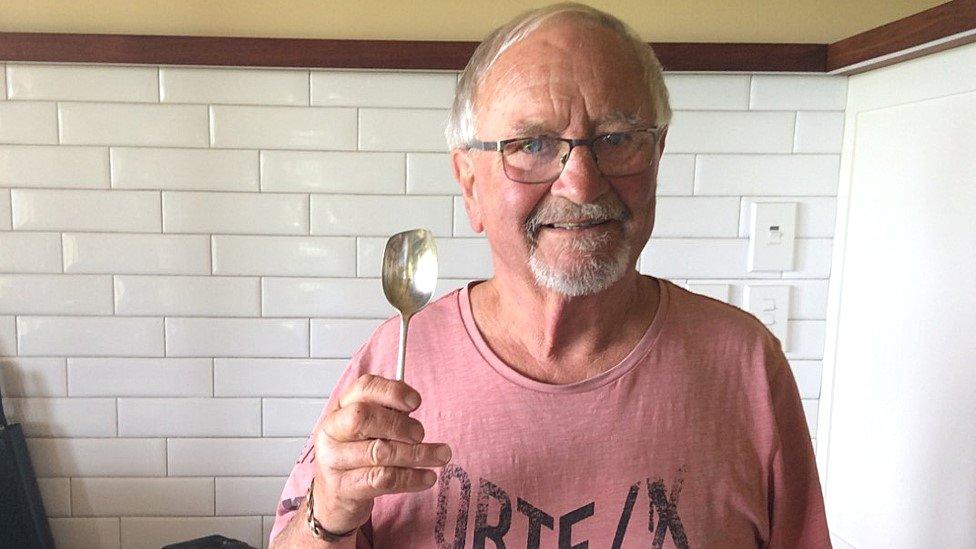
Ross Pierson with his mum's worn down spoon
Ross Pierson's mother had a favourite spoon she used in the 1950s to stir everything from porridge to stew.
"When mum died, I rescued it because it's like a family heirloom," he says.
Over time, the spoon became worn down by the aluminium and enamel pots his mum used to cook with.
"Now, why she didn't use a wooden spoon is beyond me," says Mr Pierson, "but mums being mums, you never queried what your mother did when [she] was cooking."
"I'm not allowed to use it on the table as a serving spoon because my partner says, 'You can't put that out, it's worn away,'" he says. "But when anyone sees me using it, they always want to know how it got worn away like that, and when I tell the story they all have a giggle."
Every time he uses the spoon Mr Pierson, from New Zealand, thinks of his mum.
"Mum must have held this in her hand for hundreds and thousands of hours," he says.
"I haven't got any children, but I will give this to one of my nephews or niece. One of them will want it, I hope."
Jatohn Redeaux's cooking pot and skillet
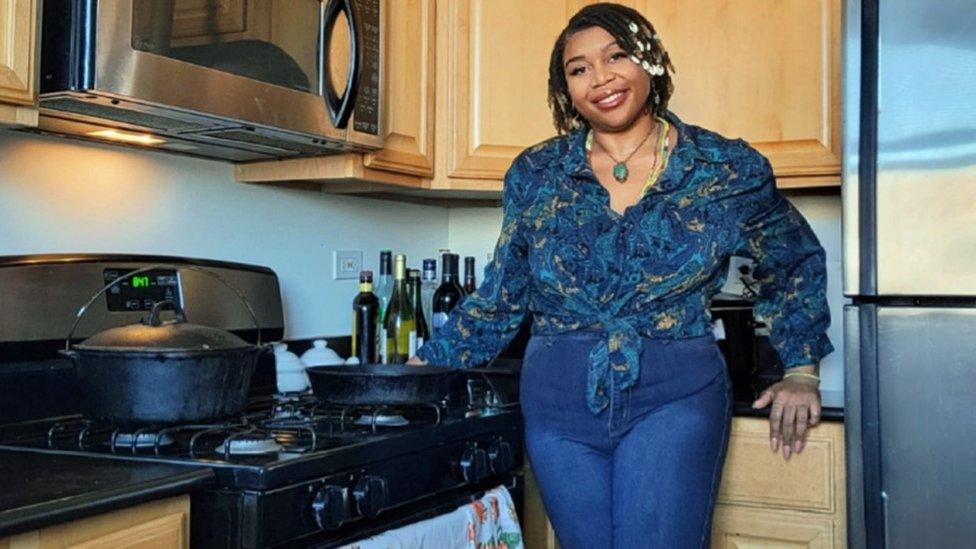
Just like her great-grandmother, the cooking pot and skillet stay out on Jatohn Redeaux's stove
The cast iron cooking pot and skillet was originally given to Jatohn Redeaux's great-grandmother during the Great Migration in the US, which involved black Americans migrating from the South to the North to find a better way of life.
"It was my great-grandfather who actually triggered their move to Chicago because of the steel mills," she says. "It was one of the few places where black Americans were allowed to work outside of being sharecroppers in the South."
Ms Redeaux says her great-grandfather witnessed brutality and racial segregation towards African Americans in the South in the 1920s and did not want this for his family. His extreme method of getting them to move, however, was a "big scandal".
"My great-grandmother didn't want to leave her family. She didn't want to leave her mother. All she knew was Mississippi," she says.
So her great-grandfather took their baby with him to Chicago, which is how he convinced her great-grandmother to move. In doing so, gave them the "opportunity to live a much better life here in Chicago".
Ms Redeaux has vivid memories of being at her great-grandmother's table. She had 17 children, so mealtimes were always lively.
Her kitchen was the heart and hearth of the home, filled with the vibrant smells of pork and spices "and the freshness of the greens that were being cooked in the pot itself", she says.
"It was a great childhood experience, and then hearing the chatter of all the family around in the very warm kitchen and my tiny 4ft 11in (1.5m) great-grandmother standing over the stove and grabbing spices that she kept out on the counter."
Just like her great-grandmother, the pot and skillet stay out on Ms Redeaux's stove today, steeped in the stories of her family's history.
Wendy Ward's glass dishes
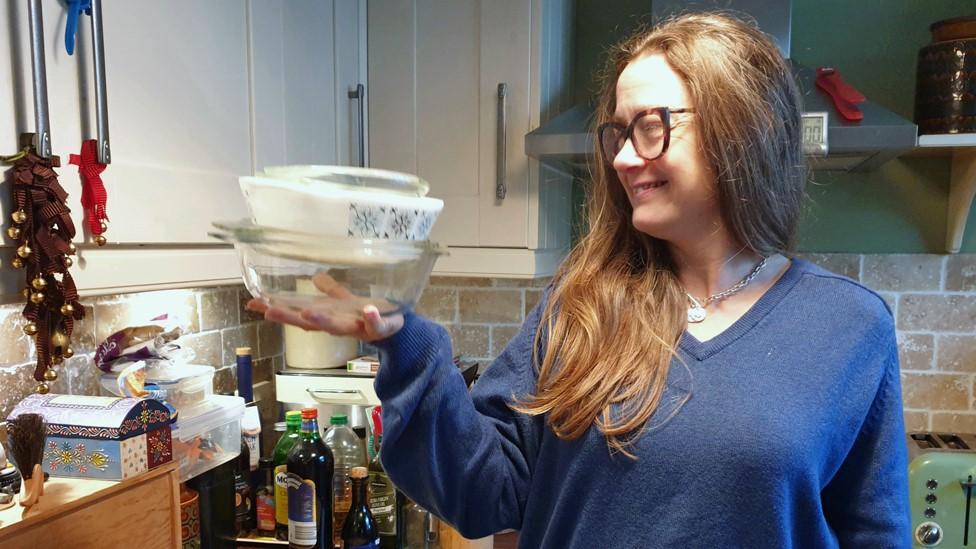
Wendy Ward and her grandma's very practical glass dishes
When Wendy Ward's grandma handed her a set of glass dishes it was without ceremony, she says.
"One of them is white with a nice, kind of 1950s-style blue pattern around the top, and the other ones are just clear glass," she says.
"I think they're so special just because of their ordinariness really and how long they've lasted, but how long they've lasted not by being kept precious and shut away," says Ms Ward.
Used extensively, Ms Ward, from Sheffield, says some of the food her grandma would have cooked in the dishes would not have been to her taste.
"I think the thing that most stands out in my mind in terms of what she might have cooked in them is tripe (offal) and onions, which even the thought of it makes me feel a bit sick," she says.
"I've certainly never cooked tripe and onions and I never would. But that sort of food has similar qualities to these dishes. It's functional, simple, honest kind of food with no frills."
Rhona Anderson's jam pan
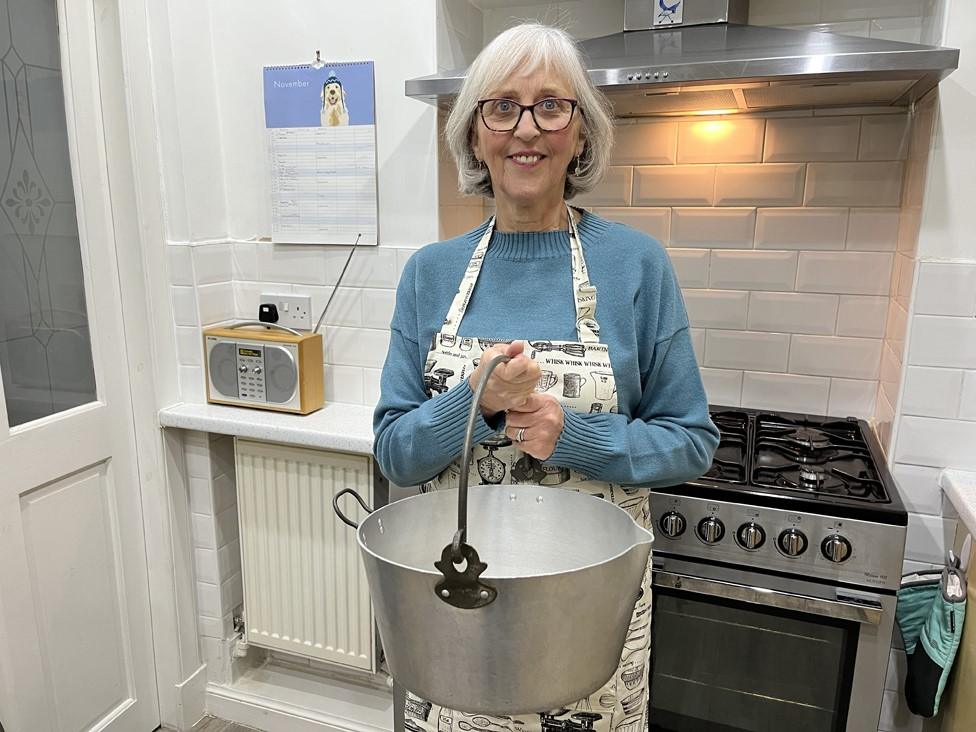
Lots of blackcurrant jam has been made in the jam pan Rhona Anderson was given by her neighbour
When Rhona Anderson was a young, newly-married woman, she and her husband moved to a village in South Ayrshire in Scotland. New to the area, she developed a bond with their next-door neighbours.
"She worked and her husband was a shepherd, so he used to walk past our house everyday with his little bucket and his stick and go off to the sheep," she says.
"They just kind of adopted us and used to babysit for us and knock on my window to wake me up if I looked as if I'd slept in in the morning."
Ms Anderson says she used to watch her neighbour cook bramble jam, and "eventually, when she had enough confidence in my own cooking, she gave me her jam pan", she says.
"I'm now the proud owner of a jam pan which I can use for all my own concoctions."
Charlie Dodds's omelette pan
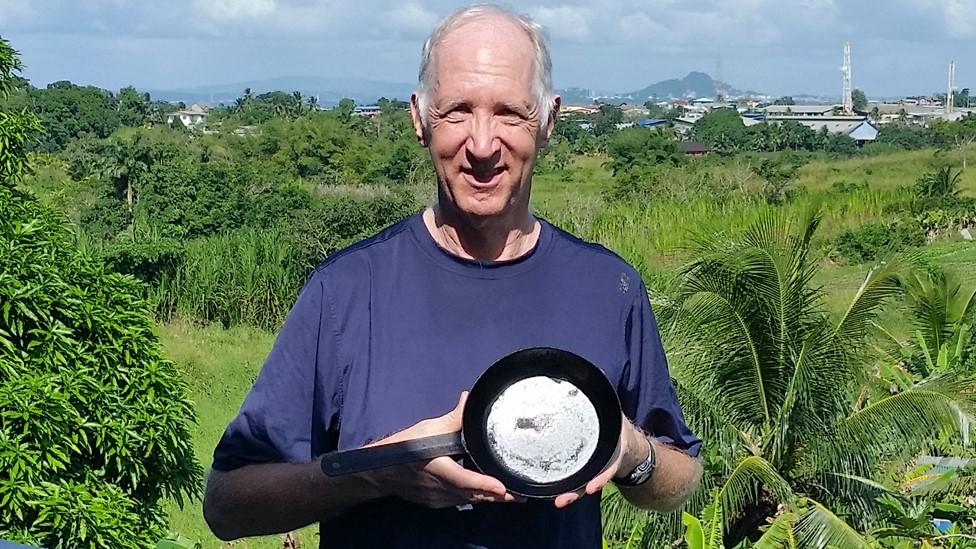
Charlie Dodds has to oil his dad's omelette pan to keep it from rusting in the humidity of southern Trinidad
"My father wasn't a big baker, my mum did most of the cooking because we're talking about the 1960s and 70s, but his pan was always special to him," says Charlie Dodds.
His father had been in the Canadian navy and used the pan aboard a naval ship in World War Two to give the ship's cook a break.
"When he talked about it, it was that real passion and feeling," he says, "and you could just see his mind going back to him physically making an omelette and enjoying it with his crew members."
"All we do is oil it to keep it from rusting," says Mr Dodds, who lives in southern Trinidad. "It's very humid down here, everything rusts."
But, every time he makes an omelette, the memories of his father's wartime stories rush back.
Deepa Viswanath's clay pot and tin alloy vessel
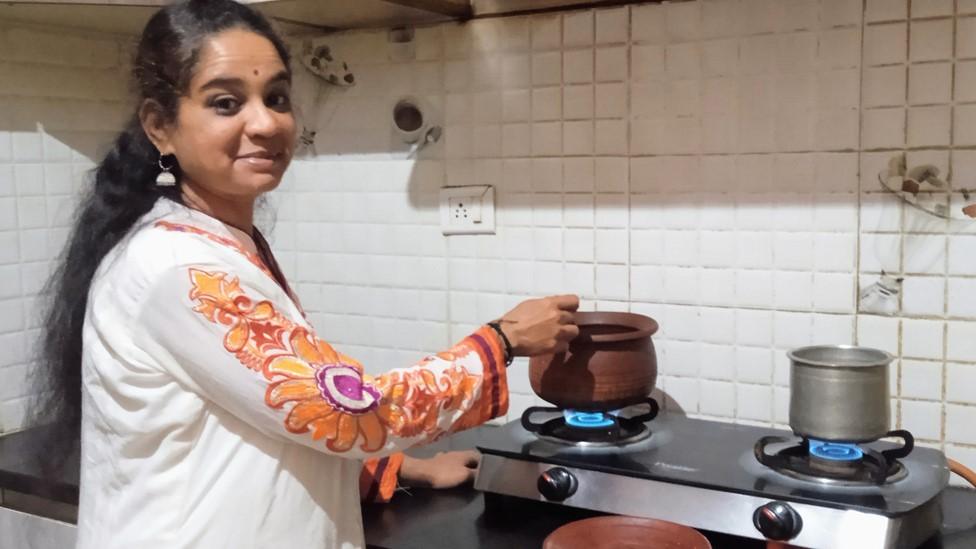
Deepa Viswanath cooking in her grandmother's pots
In Bangalore in India, Deepa Viswanath has prepared a spinach curry and lentil tomato soup in two vessels that belonged to her grandmother.
"[She] came from an orthodox Hindu Brahmin community from South India," she says.
Although Ms Viswanath's mother would cook exactly the same dishes, she would prepare them using different vessels and they never tasted quite as nice.
"Whenever I cook… I just remember how [my grandmother] toiled in that small kitchen, sweating it out for her grandchildren," she says.
"I always remember that it's not just the pots and pans I have inherited from my grandmother. It's also the love and affection that I would love to show to my own family members when I cook in these pots and pans.
"It's all about the food I cook mixed with love."
Additional reporting Elisabeth Mahy and Siobhan O'Connell
The Food Chain is on Thursday 29 December on BBC World Service. Or listen on BBC Sounds